Narrower, Bigger Diameter Tyres Of EVs Encourage Innovation Around Them
- By Bhushan Mhapralkar
- January 14, 2025
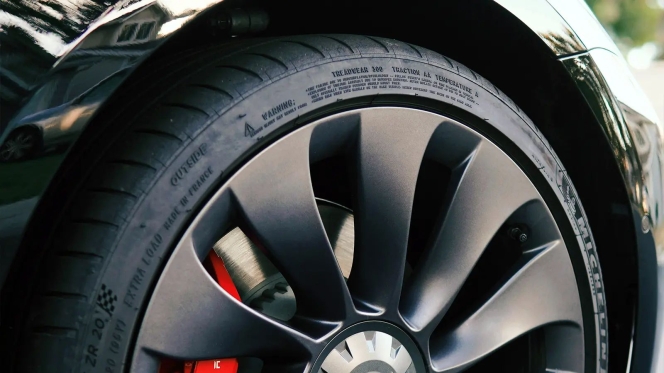
The narrower, bigger diameter tyres of electric vehicles are encouraging innovation around them. Supporting lower rolling resistance, the tyres are pushing suppliers and OEMs to explore new technological innovations. A leading German auto supplier for example has developed a ‘mechanical’ technology to ensure superior manoeuvring with near 180 degrees turn of the steered wheels.
This is a development that could be applied to ICE rear-wheel drive vehicles as well. Even, light-duty commercial vehicles such as the Tata Ace/1000 or the Switch Iev3/Iev4 that are aimed at the last mile delivery segment were backing up into a tight parking spot or navigating through a narrow lane is part of the job.
As designers and engineers toy with the idea of larger wheel wells and the ability of the steered – front – wheels to turn as much as 180 degrees, the use of narrower, bigger diameter tyres with low rolling resistance in electric vehicles is spurring yet another round of innovation, albeit as a part of the entire platform architecture that is rather software driven and subject to much virtual development in the interest of ‘time-to-market’ and a differentiated user experience.
With over 14 million small electric vehicles sold in 2023 the world over, the push has been to develop tyres that enhance operation and performance. Provide a typical ‘family’ car the ability to transform into a sports car given the wave of high torque available from the word ‘go’ in an electric vehicle.
With electric vehicle sales poised to increase 17.5 percent year-on-year globally to bridge 41.2 million units in 2029, electric vehicle tyres are expected to facilitate a further drop in rolling resistance while employing sustainable raw materials, technologies and manufacturing processes.
A sustainable EV tire design should consider the whole lifecycle of the product. Tires can be composed of well over 100 different raw materials. These are mixed and the rubber compounds are machined resulting is several components of the tire construction. EV tires are expected to be stronger and lighter, with less rolling resistance due to its importance in CO2 emissions and fuel consumption.
A key challenge being the development of tyre formulations for electric vehicles with the tread compound that is more resistant to abrasion, it is the instant torque availability that is necessitating tyres that may look like ICE vehicle tyres but are quite different in the way they handle traction and aid a longer drive range. There is the issue of kerb weight as well, not to overlook the new environmental pressures for durability and abrasion resistance.
Interestingly, new opportunities are being created on the vehicle engineering and dynamics side as well as on the side of electric vehicle tyre development and manufacture.
Starting with materials that are broadly classified as ‘renewable’ (can be sustained on time) and as ‘recycled’ (re-used and made from recovered end-of-life tyres), it is the tandem mixers that are producing more homogeneous rubber compounds, including tread compounds that employ optimised silica fillers.
Tyres for electric vehicles are demanding the use of triple or quadruple extruders for treads and sidewalls as per the vehicle weight, application and dynamics. Roller head or roller die units are also being used to produce inner liners as a single or multilayer sheet
In terms of textile coating of steel cord components in e-vehicle tyres, four-roll and Z-type calendars are used. Also, full tyre assembly machines that can produce tyres to tighter tolerances, higher specs such as superior uniformity and sans operator invention.
With electric vehicle tyres and ICE vehicle tyres being tested and validated differently primarily because of the higher load bearing capacity and low rolling resistance, electric vehicle tyres are made up of a different (softer) rubber compound than regular tyres with an eye on less noise, mentioned a testing expert at an OEM that is increasingly producing electric vehicles in India.
Pointing at an electric passenger vehicle the company launched in India recently, he averred, “Softer compounds are used to ensure less rolling noise and better transmission of torque from the motors to the road.”
With finer tolerances in need, optical machine vision systems for end-of-line quality inspections, including new technologies such as X-rays to check steel belts, cords and bead reinforcement are increasingly used.
They are used to check for air bubbles in inner liners as well. Advances in tyre design and manufacture include new developments in simulation software to model the performance of new designs quickly. This is without material input cots.
AI is being increasingly used to ensure superior analysis. AI is also used to automate manufacturing process as part of Industry 4.0 workflows.
- JSW Motors
- Tata Indian Institute of Skills
- Tata IIS
- JSW Group
- EV
- Rupam Singh
- Skilling
- skill training
- Venguswamy Ramaswamy
JSW Motors And Tata Indian Institute Of Skills Partner For EV Manufacturing Training
- By MT Bureau
- February 26, 2026
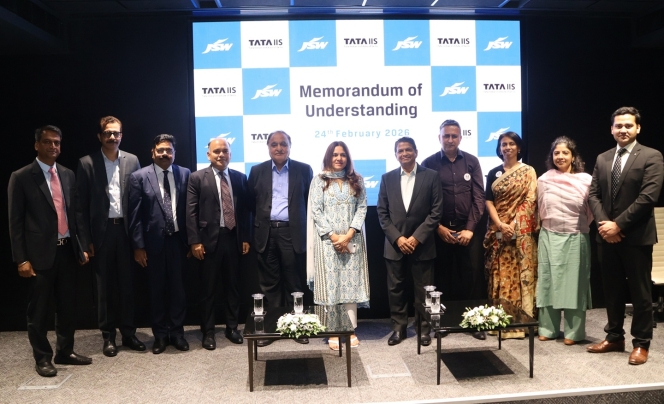
JSW Motors, the new energy vehicle (NEV) arm of the JSW Group, has signed a Memorandum of Understanding (MoU) with the Tata Indian Institute of Skills (Tata IIS). The partnership establishes a technical talent pipeline for JSW Motors’ greenfield manufacturing plant currently under construction in Chhatrapati Sambhajinagar, Maharashtra.
The collaboration focuses on a co-developed curriculum covering EV systems, automation, welding, CNC operations, battery systems and manufacturing. JSW Motors maintains rights over curriculum validation and hiring to align with plant ramp-up schedules.
Tata IIS was selected based on its training infrastructure and experience in OEM engagement. The programme utilises application-based training designed for the requirements of electric vehicle production.
The initiative is part of a broader roadmap to create an EV-ready ecosystem including suppliers, vendors and dealer networks. JSW Motors eventually intends to establish an in-house training academy focused on mobility technologies and manufacturing.
Rupam Singh, Chief Human Resources Officer, JSW Motors, said, “At JSW Motors, skilling is not an HR function, it is a business imperative. As we build our manufacturing operations, we need people who are ready from Day One. The Tata IIS partnership gives us structured capability, relevant curriculum, and the execution rigour aligned to our timelines. This is a deliberate bridge as we work towards building our own world-class training academy.”
Venguswamy Ramaswamy, CEO Designate, Tata Indian Institute of Skills, said, “At Tata IIS, our mission is to solve the nation’s skill challenges by creating a next generation workforce that is not just job-ready, but future-ready. This partnership with JSW Motors is a significant step toward that goal. By designing bespoke programs in Advanced Manufacturing, we are equipping India's youth with the high-precision skills required to drive the next generation of automotive excellence and ensuring a robust, consistent talent pipeline for our industry partners.”
IR Power Launches Energy Recovery Solution For Industrial Applications
- By MT Bureau
- February 26, 2026
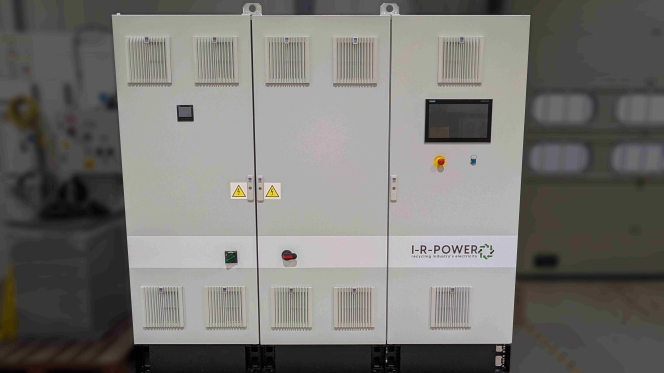
IR Power, a Scottish energy technology firm owned by MWNW Group, has introduced a standardised system designed to capture and reuse electricity wasted during industrial machine deceleration. The solution utilises a rental model where manufacturers pay through verified energy savings rather than upfront capital expenditure.
Industrial machines, such as automotive presses, conveyor systems and mixers, generate electricity when slowing down. In standard operations, this energy is typically dissipated as heat. IR Power’s technology claims that it captures this power and feeds it back into the factory grid for immediate reuse.
The system operates similarly to regenerative braking in electric vehicles. On machine clusters with frequent cycles, such as automotive press lines, the technology recaptures 10-20 percent of total electricity consumption. At current UK energy prices, this represents annual savings of GBP 50,000-100,000 per cluster.
Key features of the IR Power system include:
- Standardised Design: Three product sizes replace custom engineering, reducing technical complexity.
- Plug-and-Play Installation: Systems connect to existing equipment within hours without requiring modifications to the machines or production downtime.
- Equipment Agnostic: The technology integrates with hardware from any manufacturer, allowing for site-wide energy recovery networks.
- Fail-Safe Operation: Excess energy is routed to existing waste resistors if system capacity is exceeded, preventing manual restarts or shutdowns.
The launch comes as industrial electricity prices have risen to GBP 100-150/MWh. IR Power has adopted a zero-risk rental model to address adoption barriers. Under this framework, monthly fees are based on measured savings; if the system does not perform, the customer is not charged.
The company is initiating commercial deployments in Q1 2026, with a focus on tier-one automotive and construction materials manufacturing.
Richard Bradshaw, Founder and Managing Director, IR Power, said, "For years, energy recovery systems existed but didn't deploy at scale because they cost too much and put all the risk on customers. We've inverted that model completely. Our customers pay zero upfront – no capital expenditure, just operating expense. Installation takes hours with no production downtime. And here's the key: if our system doesn't save them money, we don't get paid; we take all the performance risk. The equipment lasts 15-20 years, so customers get over a decade of pure savings. The technology works – it always has. Our job was removing every barrier that prevented adoption: the cost, the complexity, the risk, and the disruption."
Zelio E-Mobility Opens New Plant In Cuttack to Expand Eastern India Operations
- By MT Bureau
- February 24, 2026
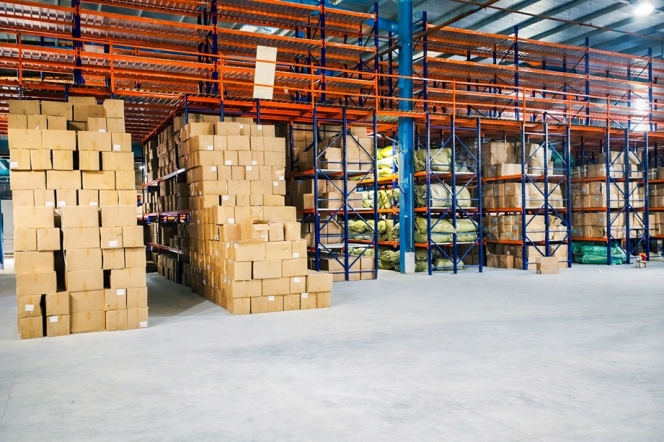
Zelio E-Mobility, a manufacturer of electric two-wheelers and three-wheelers, has announced the opening of a new manufacturing facility in Cuttack, Odisha. The plant is intended to support demand in Odisha and West Bengal while positioning the company for growth in southern India.
The commissioning of the Odisha facility, combined with optimisations at the existing Hisar plant in Haryana, has increased the company's total annual production capacity from 72,000 units to 180,000 units.
The Cuttack plant adds a capacity of 60,000 units per annum. Simultaneously, the Hisar facility has seen its capacity enhanced from 72,000 to 120,000 units through the installation of machinery and extended conveyor systems.
By locating production closer to the eastern markets, the company aims to reduce delivery timelines and logistics costs. Currently, shipping products from Haryana to the eastern region takes approximately one week.
The facility required an investment of under INR 30 million and is now operational. It is expected to create between 60 and 100 jobs for local individuals in production and operations. The company is currently in discussions with the Odisha government regarding incentives and support programmes.
Zelio E-Mobility clocked INR 1.34 billion in revenue in H1 FY2026, with net profit of INR 118.7 million. Recently, the EV company raised funds through SME IPO and has INR 360 million of unutilised funds, which it has earmarked for the current expansion. It aims to have over 337 dealerships across more than 20 states.
Kunal Arya, Managing Director, Zelio E-Mobility, said, “Eastern India has emerged as one of our strongest growth regions, with customers showing exceptional trust in our products. Setting up the Cuttack facility brings us closer to our riders and dealers, enabling faster deliveries, lower logistics costs and improved serviceability. Notably, this expansion marks an important step in strengthening India’s EV ecosystem and creating long-term value for our customers and partners.”
Skoda Auto Volkswagen India Begins Production Of New Skoda Kushaq At Pune Facility
- By MT Bureau
- February 23, 2026
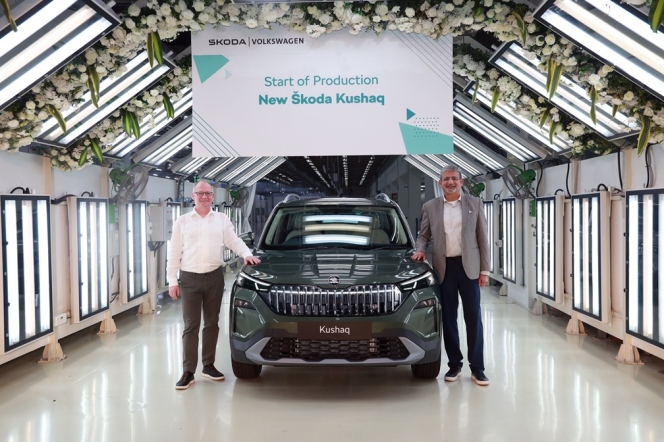
Skoda Auto Volkswagen India (SAVWIPL), one of the leading passenger vehicle manufacturers, has started production of the new Kushaq SUV at its manufacturing plant in Chakan, Pune.
The vehicle is a continuation of the Group’s INDIA 2.0 strategy, which focuses on localisation and manufacturing for both domestic and international markets.
Originally launched as the first model under this strategy, the Kushaq contributed to the Group’s sales of 117,000 units in 2025. The updated version follows its world premiere in January 2026, with customer deliveries scheduled to begin in March.
The new Kushaq maintains its focus on driving dynamics and safety standards. Updates to the model include a panoramic sunroof, a rear-seat massage function and the introduction of an 8-speed automatic transmission option.
The SUV is produced with a focus on high localisation to manage ownership costs and parts availability. It serves as a base for export operations from India to various global markets.
Andreas Dick, Board Member for Production and Logistics, Skoda Auto, said, "For us, the Kushaq holds a very special place as the first car developed specifically for a market outside Europe and born from true collaboration between India and the Czech Republic. The start of production of the new Kushaq in Pune in such a short span of time highlights how strongly India is integrated into our global manufacturing ecosystem. The robust production quality, combined with the continuous improvement in our processes, allows us to deliver feature-packed vehicles that meet domestic expectations and international standards. Kushaq’s continued success underlines how India is not only a key growth market but also an increasingly important production and export base for our global operations."
Piyush Arora, Managing Director & CEO, SAVWIPL, said, “The new Kushaq is an evolution and continues to be a key pillar in our mission to bring European engineering excellence within reach of Indian families. This SUV embodies our DNA with its robust design, advanced features and uncompromising safety. Listening closely to our customers, we have added several premium features such as a Panoramic Sunroof, rear-seat massage function and a new 8‑speed automatic transmission option, making it an even more compelling offering. With the start of production, we reaffirm our long-term commitment to India and to positioning it as a strategic manufacturing hub.”
Ashish Gupta, Brand Director, Skoda Auto India, added, “The Kushaq has been a transformative product for Skoda in India. As our first model under the INDIA 2.0 strategy, it marked the beginning of a new chapter, one that combined high localisation, world-class manufacturing at Pune, a deep understanding of Indian customers, and our commitment to democratising technology for the Indian market. With the new Kushaq, we are further building on that strong foundation, delivering European driving dynamics and 5-star safety that customers associate with Skoda.”






Comments (0)
ADD COMMENT